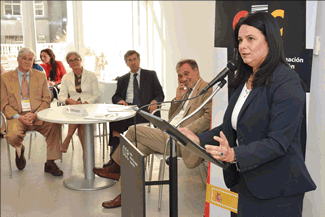
CAF promotes microfinance development in the region
March 07, 2013
- For sixth year in a row, CAF supports the Boulder Institute of Microfinance, which provides training in the field.
- The venue for the program this year will be the headquarters of the Spanish Agency for International Development Cooperation (AECID) in Montevideo, Uruguay.
- The course targets microfinance institutions' managers and executives, offering tools to improve sustainability and service quality.
(Montevideo, Mar. 7, 2013). With support from CAF -development
bank of Latin America- and the Embassy of Spain, the microfinance
course offered by the prestigious Boulder Institute of Microfinance
has begun this year in Uruguay. The program, which caters to
commercial bank, regulatory agency, credit union and NGOs managers,
offers the necessary tools to improve credit institutions'
sustainability and service quality.
"For over 20 years, CAF has been supporting microfinance development in Latin America and the Caribbean, as it contributes to economic and human growth in the region while simultaneously promotes social inclusiveness," said CAF Country Director in Uruguay Gladis Genua.
In order to attain progress in this sector, Genua said it was "fundamental to have professional staff with up to date knowledge and who are familiar with best practices in the field."
Boulder Institute Director Robert Christen said, "It is extremely important for us to create a community, links that will last for the duration of a professional career." He said the program had already reached "850 professionals in Latin America," which he described as "perhaps the strongest region among our alumni of over 4,000."
Christen urged course attendees to "take advantage of this moment of reflection to meet with other colleagues who are in the same situation as you are, and go back to work willing to do something different. We want you to change your frame of reference. The idea is to know where to look, what tool to use," and that participants finish the course "enriched."
According to Christen, the Uruguay program will train 81 professionals from 18 countries in the region, who "will be in a position to face the challenges they encounter in the environment and the industry, and will be able to contribute to microfinance development in the region, benefiting all the parties involved."
The seventh edition of the Boulder Program in Spanish, which CAF has been supporting for six years, will be offered through March 15 at the Training Center of the Spanish Agency for International Development Cooperation (AECID, by its Spanish acronym). Spanish Ambassador to Uruguay Roberto Varela, who attended the opening session, said "microfinance is a major interest area for Spanish cooperation, with hundreds of millions of dollars invested." He added that "it opens one more window into the fight against poverty, and the promotion of services that encourage productive activities' development, thus contributing to economic growth."
The Boulder Institute of Microfinance is a nonprofit organization established in 2004, based on the successful microfinance training program initially offered at the Economics Institute of the Colorado University in Boulder. Boulder Institute's Chile branch serves Latin America and the Caribbean in the programs and activities in Spanish. Its programs seek to generate spaces for reflection, analysis and debate on issues that are relevant for the sector's development. The institution encourages the generation of innovative strategies and policies that may help improve and develop the quality of financial services provided to the population's most vulnerable sectors.
The mission of CAF -development bank of Latin America- is to promote sustainable development and regional integration, by financing projects in the public and private sectors and providing technical cooperation and other specialized services. Established in 1970, it currently has 18 shareholder nations -16 in Latin America and the Caribbean, along with Spain and Portugal- and 14 private banks, and is a major source of multilateral financing as well as an important source of knowledge in the region. More information at www.caf.com.
CAF's more recent content

CAF, ECLAC, IDB and PAHO Promote Sustainable Development in the G20
The Regional Organizations of the Americas congratulate Brazil on its successful G20 Presidency, highlighting its leadership on key issues such as poverty, governance, and climate change. They also reaffirm their commitment to actions that promote equity and development in the region.
Urgent Call for Action to Safeguard Caribbean SIDS at CAF Symposium
As the global community grapples with the escalating climate crisis, Caribbean Small Island Developing States (SIDS) are running out of time to secure critical investments and support needed to strengthen their economies and protect vulnerable communities from the intensifying impacts of climate change. With the window to take decisive action rapidly shrinking, CAF - Development Bank of Latin America and the Caribbean, in partnership with the Commonwealth Secretariat and the Antigua and Barbuda High Commission, brought together key stakeholders for a symposium in London to address the critical vulnerabilities Caribbean SIDS face.